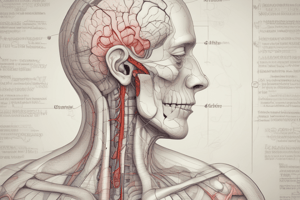Podcast
Questions and Answers
Match the following components of a neurologic assessment with their descriptions:
Match the following components of a neurologic assessment with their descriptions:
Assessing Cerebral Function = May cause disturbances in mental status, intellectual functioning, thought content and emotional behaviour Examining the Cranial Nerves = Part of the neurologic assessment divided into five components Examining the Motor System = Part of the neurologic assessment that involves assessing cerebral abnormalities Examining the sensory system = Part of the neurologic assessment that involves assessing alterations in perception, motor and language abilities as well as life style
Match the following clinical manifestations with their symptoms:
Match the following clinical manifestations with their symptoms:
Pain (acute, chronic) = Subtle or intense, fluctuating or permanent, inconvenient or devastating Seizures = Common symptoms include pain, seizures, dizziness, vertigo, visual disturbances, weakness, and abnormal sensation Dizziness and Vertigo = Common symptoms include pain, seizures, dizziness, vertigo, visual disturbances, weakness, and abnormal sensation Visual Disturbances = Common symptoms include pain, seizures, dizziness, vertigo, visual disturbances, weakness, and abnormal sensation
Match the following Glasgow Coma Scale responses with their descriptions:
Match the following Glasgow Coma Scale responses with their descriptions:
Eyes Open (E) - Verbal Response (V) - Motor Response (M) = Scoring system for assessing a patient's level of consciousness Eyes closed by edema - Oriented - Localizes (Pain) = Scoring system for assessing a patient's level of consciousness To speech - Confused - Withdraws (pain) = Scoring system for assessing a patient's level of consciousness To pain - Inappropriate words - Flexion (decorticates) = Scoring system for assessing a patient's level of consciousness
Match the following scales with their response values:
Match the following scales with their response values:
Match the following symptoms with their description:
Match the following symptoms with their description:
Study Notes
Neurologic Assessment Components
- Components of a neurologic assessment include various aspects of a patient's neurological function
Clinical Manifestations
- Clinical manifestations are observable symptoms or signs of a neurological disorder
- Examples of clinical manifestations include altered mental status, seizures, and weakness
Glasgow Coma Scale (GCS)
- GCS is a neurological scale that assesses a patient's level of consciousness
- GCS evaluates a patient's eye opening, verbal response, and motor response
- GCS response values range from 3 (severely impaired) to 15 (normal)
Neurological Scales
- Neurological scales assess various aspects of a patient's neurological function
- Examples of neurological scales include the GCS, NIH Stroke Scale, and Rankin Scale
- Scales provide a standardized method of evaluating a patient's neurological status
Studying That Suits You
Use AI to generate personalized quizzes and flashcards to suit your learning preferences.
Description
Test your knowledge about assessing and diagnosing patients with nervous system disorders in neurology. This quiz covers the anatomy of the brain, neurologic examination, health history, and clinical manifestations of neurologic disease.




